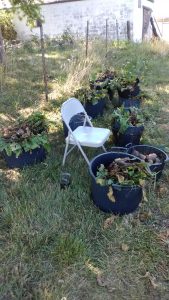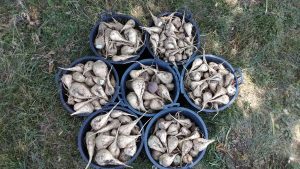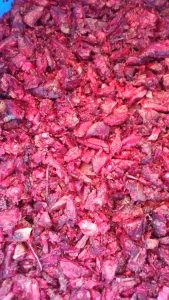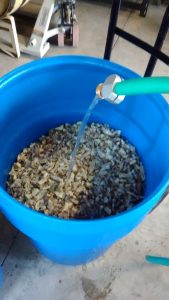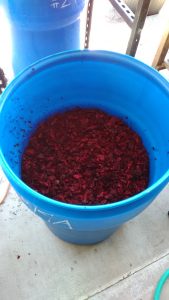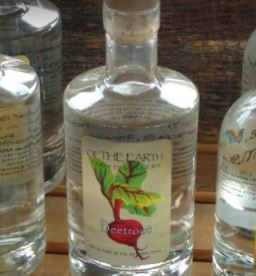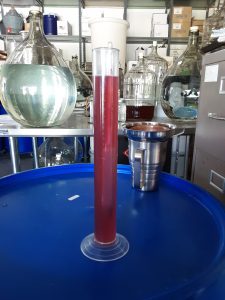Final report for FNC18-1149
Project Information
M&M Gardens has been a chemical-free vegetable growing operation since 2009.
Small-scale, diversified vegetable farmers in Missouri and Kansas would like to explore the viability of adding value to their beet root production by partnering with a local distillery to create a small-batch, double-distilled beet spirit. Economically, we hope to create a high-value product made exclusively out of locally-sourced raw materials that the farmers and distillery can share profits from. If successful, this project has the potential to open up a new sales outlet for small-farm crops. Beets are an especially promising crop for this endeavor both for their high sugar content (for converting into alcohol during the fermentation process) and their relative ease of production in our region. Developing this market for farmers may also prove to be a helpful way to strengthen crop rotations on the farms and better integrate cover crops during the summer months.This project has lots of variable potential onto which others can add: Which varieties of beets make the best spirit? Can other locally produced crops be similarly distilled, like sweet potatoes or carrots?
- Produce at least 4 tons of beets on the partner farms, including sugar beets and garden varieties
- Distill beet mash and taste-test with farmers, customers and mixologists to develop recipe
- Market finished product locally
- Evaluate the economic impact for farmers
- Note the environmental impact of cover crop integration and crop rotation on small farms facilitated during beet root production
- Share findings through social media, magazine articles and tastings
Cooperators
Research
In the first year of the project, small farmers in Kansas and Missouri planned to plant beets to harvest, mash, ferment and distill into a high proof, savory spirit. The farmers chose 3 varieties of beets to experiment with: Merlin, a common garden variety that has a high brix rating compared to other red beets; Moneta, a monogerm variety that might reduce the labor required for cultivation; and a non-GMO variety of sugar beet.
The three beets would be fermented in different combinations to see which resulted in the most sugar and yeast activity (and therefore more alcohol in the mash) and the best flavor as a distilled spirit.
Two other methods were introduced in 2019 based on the 2018 trials. One was fermenting the crushed beets with added sugar (technically made from sugar beets, which would maintain the "made with 100% beets" claim for the final product) to increase the alcohol yield. A second method was steeping the beets in a neutral grain alcohol and distilling that to capture beet flavors and aromatics.
Our spring and fall plantings were largely thwarted by a series of unfavorable planting conditions, resulting in a much smaller harvest than what we were originally hoping. However, we were able to grow enough to begin experimentation.
In the spring of 2018, we harvested 450 lbs of Merlin and sugar beets. This was enough to start three different fermentation mashes: one with just sugar beets, one with just Merlin beets, and one that had both varieties. After harvest, farmers topped and washed the beets and delivered them to the distillery for processing. The distillery crushed the beets into fermentation barrels, submerged them in water, and added a generic yeast that can thrive in a wide range of temperatures. After 2-3 weeks of fermentation, each ferment was distilled separately in a simple pot still to evaluate the amount of alcohol that was produced. Unfortunately, the only ferment that produced any measurable amount of alcohol was the sugar beet mash. (This makes sense because sugar beets were already understood to have the most sugar, but still disappointing because the Merlin produced 0 alcohol.)
From 150 lbs of sugar beets, the distillery collected 0.82435 gallons of alcohol at 100 proof (or 50% alcohol). This is enough for nine 375mL bottles of 100% Beet Distillate bottled at 80 proof (or 40% alcohol). This can be compared with Apple Brandy, which undergoes a very similar treatment, but with apples instead of beets. 150 lbs of apples can be turned into twelve 375mL bottles of 100% apple distillate (made by the same distillery) bottled at 80 proof. While these yields may seem comparable, it's important to contextualize the market value of apples vs. beets; wholesale prices for bulk apples in Missouri are between $0.09/lb and $0.16/lb where as wholesale beets are closer to $1/lb. And our farmers can sell the garden beet varieties for $2 - 3/lb at the farmers market. Given that, 150 lbs of beets for 9 bottles of finished product is not very impressive, at approximately $16.67 worth of beets per bottle (not including the cost of distillery labor or bottling materials).
A second fermentation method was used in the summer of 2019. After another disappointing beet harvest, we tried to increase alcohol yields by adding sugar (refined from sugar beets) to the crushed, fermenting beets. Starting with 150 lbs of beets, we added 41 lbs of beet sugar. The resulting alcohol yield after distillation was 3.7875 proof gallons of alcohol, so enough for 45 bottles of finished product. This brings the cost of beets per bottle down to $3.33 compared to the first all-beet fermentation.
In the fall, the beet yields were again very low. Poor germination, late plantings, and a total crop failure from deer damage at one farm, resulted in just 100 lbs of beets harvested. At the distillery, the decision was made to try a different distillation technique with the smaller quantity of beets. Instead of fermenting the beets to convert their sugar into alcohol, and then distill the ferment, we tried steeping the beets in a neutral grain alcohol and distilling that to capture the beet flavors and aromatics. Using this method, the alcohol yields were much improved, generating 24 proof gallons (enough for about 250 bottles of finished product); however, the product was no longer a "100% beet distillate." The cost of beets per bottle using this method was $0.40, the lowest of all the methods, and probably the most viable going forward.
Unfortunately, the soil health component of the project was difficult to establish and we weren't able to collect much data or positive insight around it. The narrow window between harvesting the first round of beets in the summer and planting the second round in early fall resulted in a failed cover crops in 2018 and 2019. None of the farmers participating have developed much experience around these delicate cover cropping systems, so maybe more practice would improve the process in the future. The concept is still an important one and we think it should be explored further in other projects.
Educational & Outreach Activities
Participation Summary:
On September 24, 2018, two of the project farmers met with a group of representatives from North Central and Missouri SARE at the distillery. We gave an update on the project's progress up until that point and offered samples of some of the 100% Beet distillate that was collected. Part of the SARE media team was on the tour and recorded a video of the project coordinator talking about the project. This was edited and shared on the SARE website. This encounter was not part of our original proposal for outreach, however it will undoubtedly increase the audience of people that we reach.
Throughout 2019, we have been able to provided customers with product tastings at the City Market in Kansas City, MO during Saturday markets and every weekend at the distillery's tasting room in Richmond, MO. These interactions educate hundreds of customers around the concept behind the product and how local farm produce was integrated into the distillation process. At the tasting room, customers were also able to order two cocktails based of the beetroot distillate: a traditional bloody Mary with the beetroot spirit substituted for vodka and a dirty "farmhand" martini. These both served to expand the customers imagination on how the product may be relevant to them and excite their purchases.
On June 28, 2019 a local magazine, 435, published an article profiling the beetroot spirit product that was developed at the distillery. The magazine circulates to thousands of readers throughout the metro: https://www.435mag.com/beet-juice-gets-a-new-spin-with-of-the-earth-farm-and-distillerys-beetroot-eau-de-vie/
Learning Outcomes
The main lesson learned from this grant is that a viable distillery product can be made from locally-grown beets, although it was not through the method we originally imagined. Beets were a very good vegetable to work with for this project because of their intense flavor. Even though the sugars from the beets themselves did not result in a productive fermentation, the strong flavors and aromatics came across clearly and cleanly using the re-distillation method. This accomplished multiple things, including bringing down the cost of production, allowing for larger quantities to be produced (and therefore justifying the additional investment in bottling and marketing costs), and sustained the local farmer participation at the level we were able to meet. While the pounds of beets used during the project was lower than what was originally projected, it matched well with the amount farmers were able to grow.
Large scale vegetable production was the main barrier; despite the motivation from the grant to grow lots of beets, each farmer struggled to make it happen in their small-scale and diversified farm structure. Larger, more mechanized vegetable farms may have been able to meet our original production goals. Although the cost of production in those systems may still be too high to justify making a 100% beet distillate. However, innovation on the distillery end in adding the 3rd method of distillation was able to make use of the beets that were grown and thereby salvage the work that was done. It also seems that it will sustain the relationships with the farmers and distillery; the beetroot spirit is now a continuously-made product that will require the distillery to buy more beets on a regular basis.
The main advantage of implementing this project is that it fit into the pre-existing concept of the 3 small farms involved: growing an annual vegetable crop to market to customers as a premium, local product. Dedicating the space and labor to the project was not too risky for the farmers because the crops were familiar (if grown on a much larger scale than the farmers were used to) and the impermanence of the timeline meant that if the annual crop failed, the farmer would quickly be able to move on to planting something different for income. This is different than investing in livestock or perennial crops, where success or failure takes several years to realize.
The disadvantage of implementing a project like this is that it was very much dependent on the versatility of the micro-distillery that we worked with. While distilleries are becoming more popular throughout the country, very few operate with the freedom to do this sort of experimentation (i.e. very small batches aiming for an incredibly niche product). We were very lucky in our region to have a distillery capable of such flexibility and openness to experiment even if it turned out to be a failure.
Overall, this project showed us not only that the original idea of working with beets was viable, but that it is also worth exploring other vegetables for potential products. Steeping the vegetable in neutral alcohol and capturing their flavors and aromatics through distillation worked very well, and could work for a host of other strongly flavored produce (e.g. carrots, sweet potatoes, celery, etc). The permutations are so varied, that we would recommend that interested farmers and/or distilleries reach out to prospective partners and explore these possibilities. Our project is a decent blueprint for how to approach the task, and if the end product tastes good, there is a chance that there will be a market for it in the burgeoning market of craft distilled and cocktail products.
Project Outcomes
The farmers involved would like to thank SARE for facilitating this project; it would not have happened without their support. It was a learning experience for each of the farmers that will inform our future projects and growing habits. The grant provided a healthy amount of support in getting the project off the ground, sharing the process and findings with a larger audience, and cushioning the blow of potential failures. For that we are very grateful!
